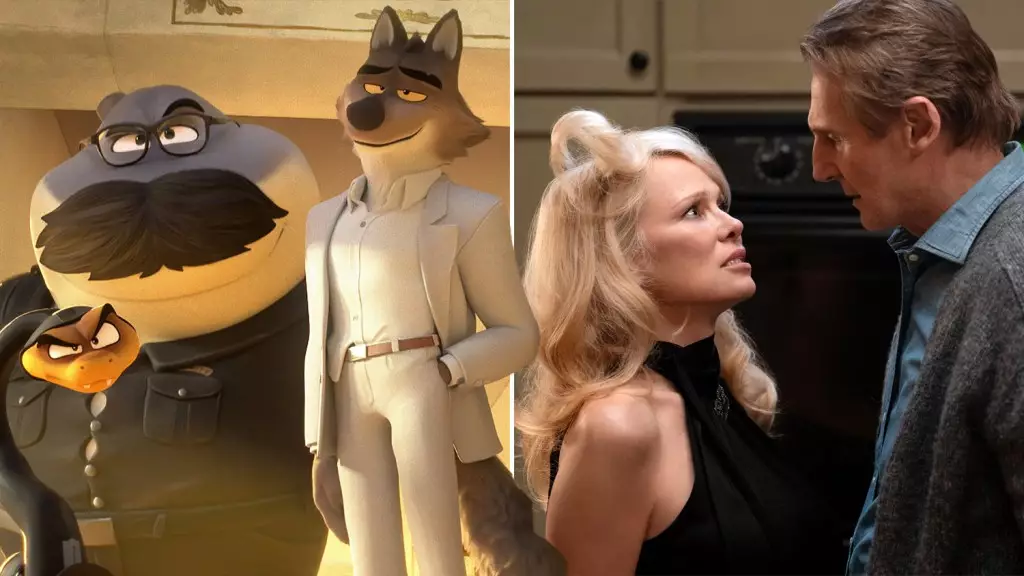The recent influx of new releases at the box office paints an overly optimistic picture of Hollywood’s current state, but beneath this facade lies a troubling stagnation driven by outdated models and misguided theatrical ambitions. The debut of “The Bad Guys 2” might seem promising with a $2.25 million start, but in reality, it’s a reflection of dwindling consumer engagement and a market increasingly dulled by oversaturation. Despite being an improvement over last year’s opening figure of $1.15 million, the trajectory remains far from robust. What we are witnessing is a struggle to achieve genuine growth, with studios chasing ephemeral successes rather than investing in long-term value.
Furthermore, the projected $20 million for “The Bad Guys 2” hints at a fragile rebound that isn’t sustainable without systemic changes. The film’s production costs have escalated to $80 million, with a notable increase over its predecessor, yet even this substantial investment doesn’t guarantee permanent revival. Its accompanying critic score—though respectable at 85%—falls short of the first installment’s 88%. This slight dip signals an over-reliance on franchise familiarity, which increasingly fails to excite audiences in an era dominated by streaming and on-demand viewing.
Resurrecting Old Franchises: An Exercise in Futility?
Paramount’s attempt to breathe new life into “The Naked Gun” exemplifies Hollywood’s obsession with nostalgia, yet it remains a gamble that often results in commercial disappointment. Opening to $1.6 million from shows starting at 7 p.m., the reboot appears to lack the spark necessary to captivate modern audiences fully. Its production budget of $42 million also raises questions about return on investment, especially when competing with more audacious or culturally relevant content. The previous success of comedy classics like “No Hard Feelings”—which managed a relatively healthy opening of $2.15 million previews—demonstrates that humor rooted in contemporary relevance and fresh storytelling always outperforms tired remakes.
This reliance on nostalgia often results in a dilution of creative originality, further alienating younger viewers who find it difficult to connect with recycled narratives. Moreover, critics on Rotten Tomatoes have greeted “The Naked Gun” with a 90% fresh rating, yet audience reception remains mixed at 73%, illustrating a disconnect between critical acclaim and viewer enthusiasm. Hollywood’s fixation on reviving franchises assumes guaranteed profits, but history shows this is merely a mirage—a costly mirage that often leaves studios with hefty losses and declining public trust.
The Erosion of Confidence: The Audience’s Shift Away from Theatrical Experiences
Meanwhile, “Together,” Neon’s romantic horror film featuring Dave Franco and Alison Brie, illustrates a broader trend: the waning appeal of traditional theatrical releases for niche genres. Grossing only $1.35 million on its second day, with a forecast of $8–$10 million over five days, the film’s modest performance underscores an industry struggling to find new audiences willing to sit in theaters. Despite critics’ praise—déjà vu here with a critics’ score of 91% and an audience rating of 79%—the film’s performance suggests that even well-received movies cannot rely solely on critical acclaim to draw viewers.
The cultural shift toward streaming, coupled with the fragmentation of attention spans, means that studios must rethink the very concept of “success.” The once-solid theatrical window no longer guarantees profitability, especially for genre films that thrive on niche audiences. The fact that “Together” is behind the box office numbers of Ari Aster’s “Midsommar” from 2019 demonstrates how limited the theatrical market has become when compared to streaming platforms that offer instant gratification and personalized viewing.
The Big Budget, The Bigger Fall: The Case of “The Fantastic Four”
Among all recent releases, Marvel Studios’ “The Fantastic Four: First Steps” epitomizes how the most heavily promoted blockbusters often face the steepest declines. With a $200 million budget and an opening gross of $158.3 million, the film’s second-weekend projection of about $45–$47 million reveals a 61% drop—a decline that is increasingly typical for major franchises. This pattern reflects audiences’ growing fatigue with superhero saturation and their skepticism towards what Hollywood considers “safe bets.”
The decline also exposes a critical flaw in Hollywood’s marketing strategy: an overemphasis on spectacle rather than storytelling. By focusing on screen size and special effects, studios neglect the fundamental appeal of smart, engaging narratives. Sadly, this approach diminishes the long-term potential of franchises, rendering them as temporary cash cows rather than lasting cultural phenomena.
A Flawed System in Need of Disruption
The consistent pattern of underwhelming earnings, despite eye-catching marketing campaigns and strategic franchise expansion, indicates a systemic failure. Hollywood’s unwillingness—or perhaps inability—to adapt to the digital age, to prioritize diverse storytelling, or to listen to evolving audience preferences, guarantees a bleak future for the theatrical business. Instead of doubling down on costly remakes, CGI spectacles, and franchise fatigue, studios should pivot toward genuinely original, culturally relevant content that aligns with contemporary values.
It’s not merely about economics; it’s about respecting the intelligence of audiences and recognizing that quality storytelling and authentic experiences are what truly sustain the entertainment industry. Without this shift, the industry risks further decline into irrelevance, relying on bloated budgets and nostalgic echo chambers that no longer resonate with the modern viewer. The box office isn’t dead; it’s just profoundly broken, and only courageous reform can set it back on its feet.

